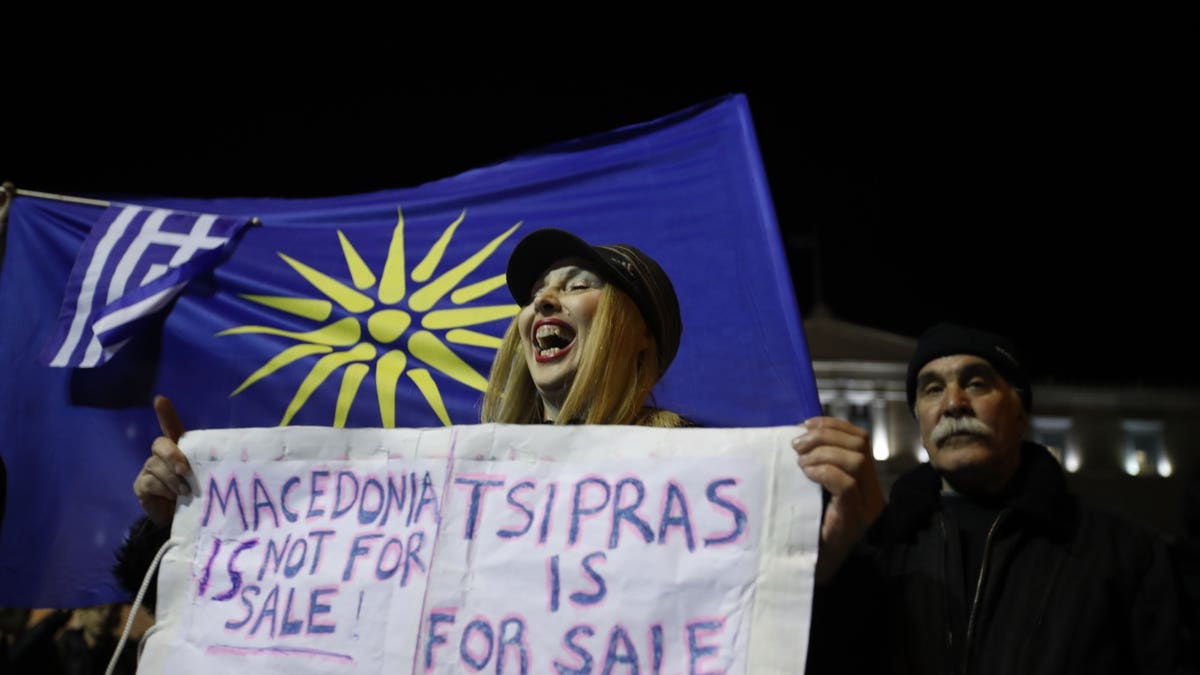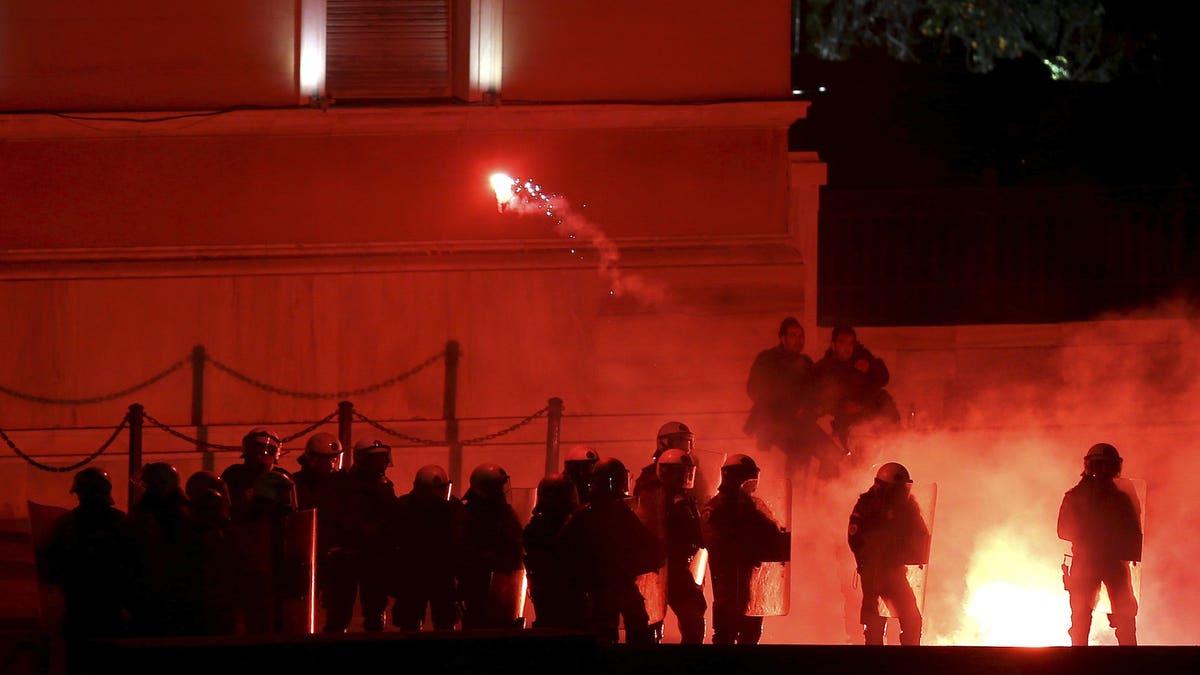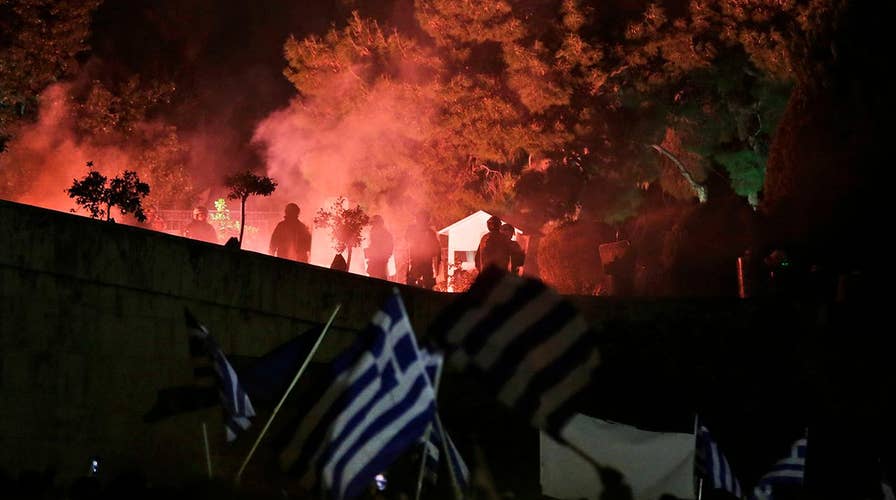Protests turn violent outside Greek parliament as lawmakers were debating agreement to rename Macedonia
Raw video: Greek riot police fire stun grenades, tear gas to disperse protesters who tried to break through a cordon outside parliament as lawmakers inside debated agreement to rename Macedonia.
Thousands of Greeks took to the streets on Thursday to show opposition to an agreement normalizing relations with neighboring Macedonia, just a day before lawmakers are set to vote on the deal ending a 27-year dispute.
Authorities said around 2,500 protesters gathered outside the Greek Parliament in Athens while politicians debated a deal that is likely to pave the way to Macedonia joining NATO and even the European Union.
Protesters chanted “Hands off, Macedonia,” while a small group of people threw Molotov cocktails, rocks and flares at riot police officers, prompting the use of tear gas and stun grenades.
At least 10 people were arrested, while another 133 were detained on suspicion of committing or planning acts of violence.

The opposition to the deal – which would approve Macedonia’s name change to North Macedonia and would require Greece to back the country’s NATO and EU membership applications – stems from Greek nationalist sentiments and celebration of the ancient heritage of Alexander the Great and his father Philip II of Macedon. (AP)
MACEDONIA OR NORTH MACEDONIA? VOTE TESTS A NATION'S IDENTITY
The opposition to the deal – which would approve Macedonia’s name change to North Macedonia and would require Greece to back the country’s NATO and EU membership applications – stems from Greek nationalist sentiments and celebration of the ancient heritage of Alexander the Great and his father Philip II of Macedon.
The area of the modern state of Macedonia has historically been part of Greece, but since the collapse of Yugoslavia in 1991, Macedonia became independent and took the name of the past ruler, infuriating Greeks and raising fears that the country has territorial ambitions, according to the BBC.
Many Greeks also believe that Macedonia, which voted in a referendum last year to change its name to North Macedonia in an effort to please the neighbor, still belongs to Greece.

Riots police stands guard as opponents of Prespa Agreement throw a flare during a rally outside the Greek Parliament in Athens, Thursday, Jan. 24, 2019. Greek lawmakers are debating a historic agreement aimed at normalizing relations with Macedonia in a stormy parliamentary session scheduled to culminate in Friday vote. (AP Photo/Petros Giannakouris)
“Politicians come and go, but Macedonia will always be Greek,” said Thanassis Godis, a speaker at a rally in Athens. “Their country is based on a lie. Our struggle isn’t over.”
The agreement also prohibits the two countries from disputing each other’s territory, creates an expert panel to come up with an objective interpretation of history, and asserts that the terms “Macedonia” and “Macedonian” refer to different historical time rather than the modern state, according to the BBC.
The new Republic of North Macedonia also promises to review any public buildings or monuments that refer to ancient Greek history.

Greece's Prime Minister Alexis Tsipras delivers his speech during a parliament debate about Prespa Agreement in Athens, Thursday, Jan. 24, 2019. Greek lawmakers are debating a historic agreement aimed at normalizing relations with Macedonia in a stormy parliamentary session scheduled to culminate in a Friday vote. (AP)
Greek lawmakers will vote on the deal on Friday. Prime Minister Alexis Tsipras urged the lawmakers to vote in favor and he’s expected to win the vote with a small majority.
“Nationalism in the Balkans has led to disasters,” Tsipras said. “And I believe the time has come to escape nationalism.”
CLICK HERE TO GET THE FOX NEWS APP
Yet opposition parties are fighting against the deal they say is a “national defeat,” with the conservative New Democracy party promising to block Macedonia’s EU bid if it wins the election.
The Associated Press contributed to this report.









































